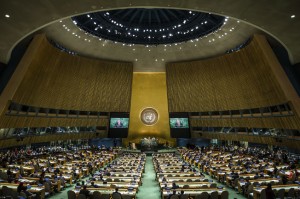UN Attempts to Alleviate Pain of Religious Violence: Where Do Nonbelievers Fit In?
 The UN General Assembly in New York.
The UN General Assembly in New York. Last week the United Nations Committee for Freedom of Religion or Belief (on which I represent the American Humanist Association) met in Manhattan to discuss, in part, the UN’s official proclamation making August 22 “International Day for Victims of Violence Based on Religion, Other Beliefs.”
I’m pleased to see the UN actually take up the issue of protecting minority rights against ethnic and religious violence. It’s a huge step in the overall acknowledgement that violence against “the other” diminishes our core humanity and, in a very real sense, leaves those who have been harmed with nothing but loss and a lifetime of sorrow and pain. “We hope that [the proclamation] will help combat hate crimes and acts of violence related to religion or belief, and will further strengthen interreligious dialogue,” the UN press release reads, further noting that “the resolution can serve in promoting diversity and inclusion.” How exactly will the proclamation combat violence? I believe the hope is that by promoting the August 22 date and sharing stories it will bring awareness to these problems, but it’s unclear how the proclamation or the UN will actually hold anyone accountable.
Religious leaders from numerous countries who represent the world’s primary faiths support the UN’s measure. Signees include members of the Holy See, the United States, several Muslim nations and a large host of other states. Ethno-religious violence toward religious minorities is also acknowledged. Unfortunately, no nation or group has named the protection of atheists, agnostics, or humanists in their specific statements addressing the proclamation.
In fact, in an Orwellian development, the UN press release noted that the representative from Syria
warned against provocations by elected groups, which in many countries take advantage of deformed words to spread hatred in the press, on electronic media platforms and by other means. Rejecting the pretexts used by such groups — including freedom of expression—he emphasized that all Governments have the obligation to prosecute those who perpetrate acts of violence.
These “deformed words” usually serve as a cover to, in fact, harass, jail, or murder nonbelievers and atheist bloggers because of blasphemy laws.
My consistent concern since I began my work at the UN in 2014 is this: the world body has an embedded view that religion can only be a source for good. Certainly there are good people who use their faith for healing in this world and whose actions make the world is safer and kinder. But the UN as an organization coddles religious factions, many of whom commit faith-based violence. It fails to stand up to nations who threaten to withhold support of UN measures based on their religious views. At times it seems that the politics of expediency under the guise of cultural relativism surpasses the need for objective and rational accountability.
The UN’s somewhat myopic focus that humans can only be “good with a god” not only ignores historical fact but also ignores modern intra- and extra-religious violence around the globe. Most religious violence is committed by people and whole nations that are indoctrinated in religious philosophy or other forms of theological bigotry. Usually this holds people of different faith doctrines, ethnicities, and philosophies—especially atheists, humanists, and other nonbelievers—as vile and less than human. In 2019 there are still nations where one can be jailed or killed for nonbelief.
Here in the United States, where there has been a steep rise in violence and acts of hate against Muslims and Jews, the culprits have typically been white nationalists who self-identify as Christian fundamentalists. The 2017 violence in Charlottesville, Virginia, for example, was as much an act of fascism as it was a form of religious terrorism. Bands of white nationalists shouted “Jews will not replace us!” and in the dark corners of the Internet, where most of these neo-Nazi’s hang out, they rejoice when members of their misguided creed murder Muslims, Jews, and African-Americans.
While the media and others may prefer to cast individuals who shoot up synagogues, mosques, or churches as lone wolfs with mental or emotional disabilities, their hate is centrally based on years of indoctrination focused mainly on two deeply intertwined ideals. The first is the idea of white racial superiority, and the second is the view that America must be a fundamentalist Christian nation.
However, if we are to confront religious hatred from all quarters, the playing field certainly must be leveled. The proclamation from the UN is a step in the right direction, especially if the motivation is to stop the harm, harassment, or subjugation of ethnic groups, religious minorities, and freethinkers. If the proclamation truly spotlights the victims who have been harmed by religious faith and theological/philosophical explanations of such anti-humanistic actions and policies, then that’s a fine message to send to the world as well.
But this deeply good and well-intentioned world organization is at times a paper tiger. Hard work and moral courage helped to create the United Nations. To sustain it, the very freedoms the UN founded in 1945 must include the acknowledgement, protection, and acceptance of those who are godless. This proclamation is important, but for it to have gravitas and meaning, it must be all-inclusive.
